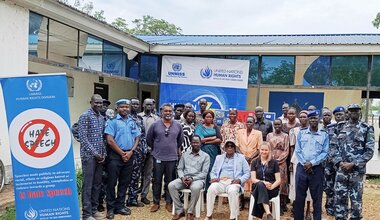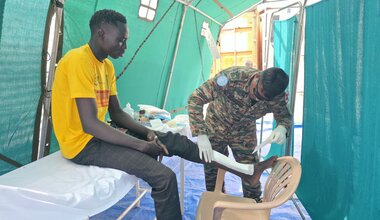South Sudan Speaks: Stephen Matut, Peace and Reconciliation Commission, Unity state
The world’s youngest nation, South Sudan, celebrates 10 years of becoming an independent state in July 2021. Stephen Matut has been a part of the country’s ongoing transition from civil war to peace through the past decade. In this interview, he shares his recollections of the hope that freedom brought to all communities here and takes stock of what, he believes, is required for a future of durable peace and prosperity for the South Sudanese.
Could you tell us a bit about what the situation was like for the South Sudanese before Independence?
We fought for 21 years before finally gaining our independence from our northern neighbor, Sudan. It was a difficult time and many of our brothers and sisters gave their lives to ensure a better future for us today. The situation was made worse by a severe famine in 1998. However, with the signing of the Comprehensive Peace Agreement in 2005 in Nairobi, Kenya, things started improving. And here we are now, commemorating 10 years of being a free country with our own identity. Of course, there are still many problems, we descended into civil wars which caused widespread death and displacement, but I am hopeful that the Revitalized Peace Agreement of 2018 will lead us to unite under a single national identity. This is the same hope we had when the referendum took place in 2011 and the South Sudanese spoke with a single voice.
What was the overarching sentiment like on 9 July 2011?
I remember it like it was yesterday. I was a member of the organizing committee for Independence Day because I was working in the Parliament at that time. President Salva Kiir gave a wonderful speech that heard by the whole country and the world at large. It was the birth of a new era. The international community was present in full force. Former UN Secretary General Ban ki-moon was there together with members of the African Union and the diplomatic community. What’s more on 13 July, South Sudan was recognized by the UN Security Council and the General Assembly in New York. It was an overwhelming feeling of hope, of unfettered joy.
Ten years have passed since that day; how do you look back at this period?
In the first couple of years, we as South Sudanese were united, we recognized each other as having one identity. The country developed rapidly. But then, we plunged into civil war and it was a crisis like no other we had faced. We have been through dark days since then. However, with the signing of the peace deal in 2018 and the current transitional government of national unity, there is light at the end of this tunnel, I’d like to believe. However, we need to see our leaders rise up to the occasion, put the country and its communities first by stopping violence and giving young people the ability to be economically self-sufficient. We need peace, we need development, we need to feel like one nation again.
What are your hopes for durable peace in your country?
When we first emerged as a new nation, we were focused on raising South Sudan to be at par with internationally developed countries. But since 2013, we have been divided along narrow ethnic lines and resources are controlled by a few. The country is no longer as progressive as we were; intercommunal conflict is rife. We have to be able to coexist peacefully so that we can rebuild our country. So, it’s not a question of my own hopes; we will be lost in an endless cycle of subnational conflict and doom future generations to nothing if we don’t rise above and be compassionate with one another. We must start accepting that we are a diverse people, but one nation. We must forgive each other for the past and move forward together.
 UN
UN United Nations Peacekeeping
United Nations Peacekeeping





